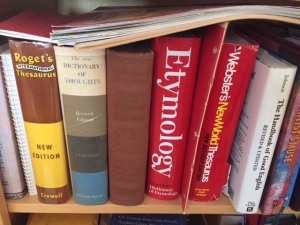Tuesday, July 4, 2017

“Wanted: someone willing to sit for hours in front of a blank page and come up with words and sentences which will hopefully become riveting fiction, compelling memoir or beautiful poetry. Financial compensation: potentially zero. Benefits: an excuse to avoid working, housecleaning, laundry, and exercise. “
During a recent promotional event for the People of Yellowstone book at the Old Faithful Inn in Yellowstone National Park, many visitors asked me if I knew when Old Faithful would erupt, but some stopped by our display table to peruse the book and ask questions about writing. Several said that they would like to write a book, too. Some imagined they would write fiction, but most wanted to write about their own life.
“How do you begin a memoir?” they asked. “What’s the difference between an autobiography and a memoir?”
Why do people think they want to write a book? I asked myself.
I’m not sure if I can answer this for others, but I do know that writing is a wonderful and mysterious heroic journey during which it’s possible to make amazing discoveries about our self and the world.
“Heroes take journeys, confront dragons, and discover the treasure of their true selves,” says Carol Pearson, author of The Hero Within. I think we can say the same thing about initiating a writing project. It’s a heroic feat. But how does it begin?
Most of us wouldn’t consider entering into hand-to-hand combat or a tennis tournament without some training, but to accomplish a piece of writing – a short story, essay, or even a book – it is possible to hone your skills on the job. The first requirement is to put words down on paper (or into a computer) and enough words to reveal what it is that you might be writing about.
Writer training involves the act of writing, and reading. Just as we listen to masterful musicians to experience how well music notes can be played, we must also read well-written books to feel language come alive on the page. Reading informs us as to how emotions and details can be expressed with words. Great writers are always readers.
Skillful writing is learned by doing. You can build knowledge of the craft by exploring diverse topics of literature. What is the difference between fiction and creative nonfiction? What is expository writing? How do you write a scene? Writing is sometimes about telling people what they didn’t know, but it’s also about showing people what they already know. Writing is also about revision.
Be disciplined – and greedy. Don’t feel guilty about taking the time to write. Heroes who are going to battle do not feel guilty about practicing how to ride a horse or throw a spear. Think of writing as your first responsibility. Think of it as a job. You make time for other things after the writing.
Joyce Carol Oates (author of more than forty novels and numerous other works) says that almost every writer deals with the problem of getting into the creative zone. Our attention is on many different events and subjects at any on moment, and it’s easy to be diverted by people and media, the noise of life and the attraction of distractions. You may need a transition that clears your mind and feelings to move you into the world of creating stories. This might include establishing an environment – a place – that helps you turn on your writing mode sooner. Louisa May Alcott had a tiny writing table in front of a window in her bedroom. Later, when faced with a deadline for the publication of Little Men, she rented a room in downtown Boston and stocked it with apples for snacking.
Build your stamina for writing by getting enough exercise – and by taking proper breaks from sitting. When Old Faithful is not spouting, it is building up pressure underground. There is a reciprocal relationship between your interior and exterior life.
And what do you write about? If you are writing fiction, it will be about how your character got from here to there. If it’s memoir, it will be about who you used to be and how you got to be who you are now. Get started today by writing a paragraph that begins with, “I remember…”
Memoirist Abigail Thomas adds to this that the writer of memoir writes the truth “as best as she can tell it… Be honest, dig deep, or don’t bother.”
If you are visiting the town of Truro on Cape Cod this summer, join me for an intensive and fun workshop on the art of memoir writing at Castle Hill Center for the Arts, August 7 – 10, 2017.